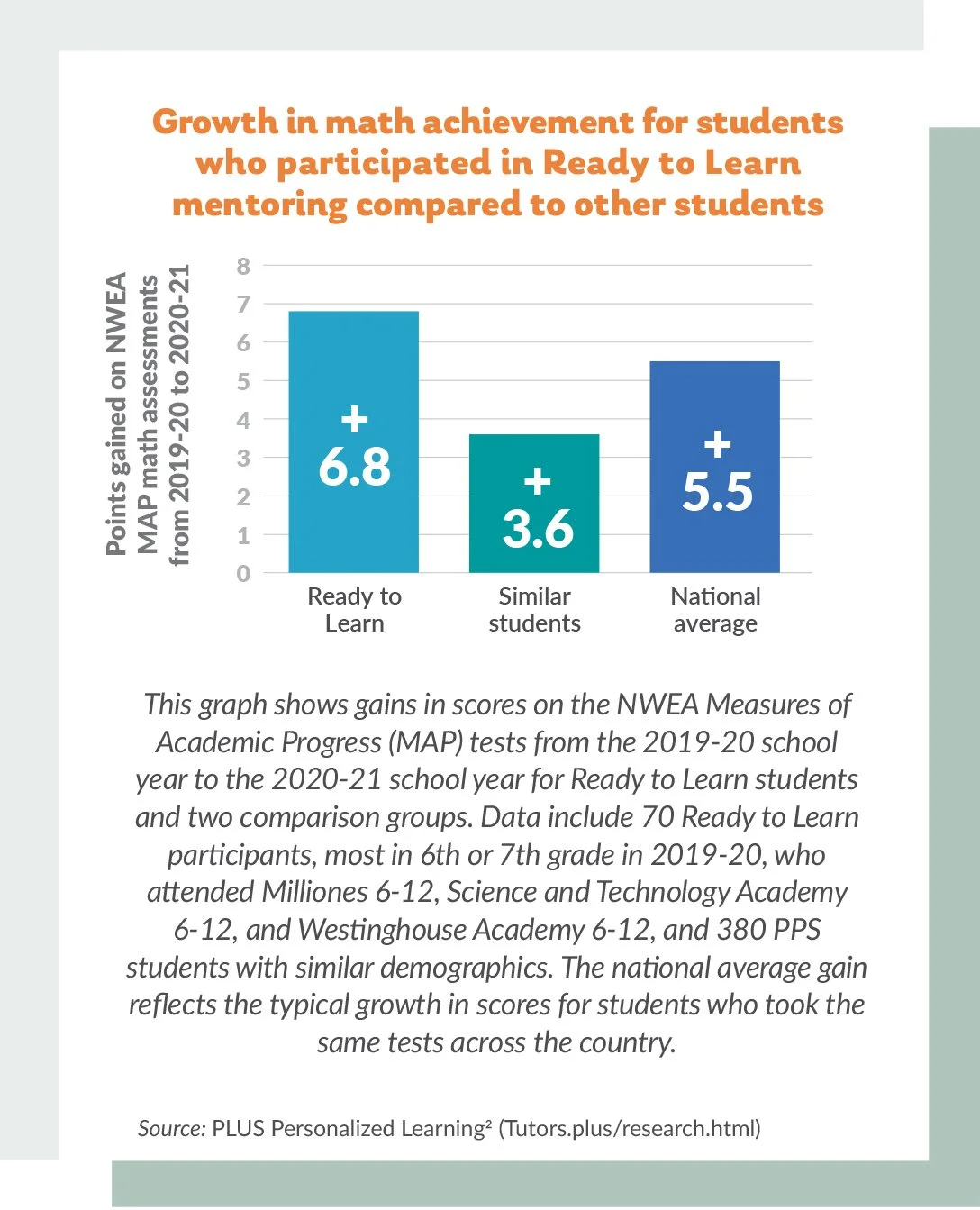Tutoring Snapshot: Ready to Learn
Rising up: Tutoring snapshot, Ready to Learn - Michael Wells, student
2022 | Written by Faith Schantz, Report Editor
The need for high quality math learning experiences for underserved students led the Center for Urban Education at Pitt to partner with PLUS Personalized Learning2 at CMU on the math mentoring program Ready to Learn (now MathUp Connections). With funding from the Heinz Endowments and the Chan Zuckerberg Initiative, the program combines human mentors with computer-aided learning, for 6th through 8th graders at Milliones 6-12, Science and Technology Academy 6-12 (Sci-Tech), and Westinghouse Academy 6-12. (A+ Schools Executive Director James Fogarty is a member of the PLUS Personalized Learning2 Advisory Committee.) Though full implementation started as recently as the 2019-20 school year, Ready to Learn participants have already shown significant increases in math achievement (see the graph below).
Sci-Tech 9th grader Michael Wells, who lives in Brookline, participated in both the after-school and summer components of the program over the past several years. Before the pandemic, the mentors, Pitt and CMU students, came to his school. He could choose Monday and Wednesday or Tuesday and Thursday to attend the two-hour sessions, which were organized around social time, one-on-one time with a mentor, online tasks, and working on projects in small groups.
He recalls meeting one of his mentors. “We just started talking casually,” he says. As it turned out, they shared the same musical tastes, and they both liked shoes. “So that’s how we bonded. And then we started getting into math-related questions, like where I’m at in my class and why I was in the program, and we just grew from there.”
Michael wants to go into computer engineering, and he wasn’t “horrible” at math, but he wasn’t the best at it either, he says. During the school day, he sometimes took advantage of the lunchtime support sessions teachers held. Along with the hope of boosting his skills at Ready to Learn, he was attracted by the stipend students were offered. But as time went on his motivation changed. “I started to enjoy math,” he says. “I liked going so I could get more involved.”
The software the program uses involves an “intelligent tutor” that modifies lessons based on the student’s responses and offers individualized resources. Michael regularly looked at his data with his mentor and they worked together to set and monitor goals.
The program includes a social justice component designed to make math more meaningful for students. Michael remembers calculating percentages for a project that related the presence of food deserts in Pittsburgh to residents’ incomes. During the pandemic, students figured out quantities of basic supplies a household would need to get through a period of quarantine. Michael liked working on the projects “because it showed me that you could really use math to solve real-world situations,” he says.
The mix of one-on-one time with a mentor, working in small groups, and working alone at a computer suited him well. “I’m open to a lot of ways of learning. I like the one-on-ones. They’re cool. And I like the small groups because I like talking to other people, working with other people,” he says. Small groups could be stressful when he felt like the only one who didn’t understand what was going on. Over time, though, he saw that others didn’t always understand either, and it wasn’t as big a deal as he had thought.
Now, in the classroom, he says, “I feel more confident when I’m asked a question. And not really scared too much if I get it wrong.”
Visit Ready to Learn for more information, including how to register a student for the program.
